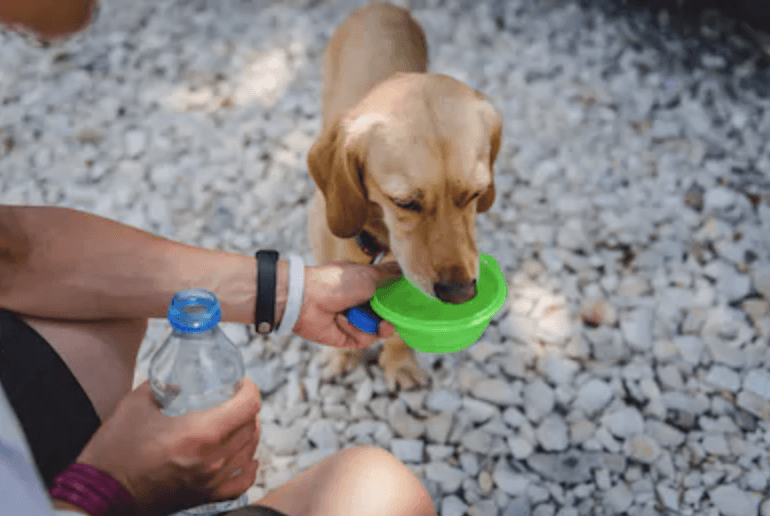Summer Series: Heatstroke

The summer has so much to look forward to! Beaches, barbecues, fireworks, hiking, lakes and so much more. While our pets may not take part in all of these activities, they may join us for some of them or be affected by others. Over the next few weeks, we’ll be sharing common summertime concerns for our pets starting with heatstroke.
The summer can get hot and humid! While we can dress down in shorts and a t-shirt, our pets have a permanent fur coat that can make the heat unbearable. Specific pets are even more at risk than others including Brachycephalic breeds such as pugs, bulldogs, or Himalayan cats, breeds with thicker fur such as huskies or Persian cats and overweight pets.
In order to prevent heatstroke you should never leave your pet in a car and always ensure your pet has access to a cool, shaded place to escape the heat. Your pet also needs constant access to water. Whenever you are planning an outing with your pet, make sure to plan ahead! Bring a bowl and water and make sure you have a cool shaded location your pet can escape to if needed. If your plans involve a quick stop at the store or a restaurant, never leave your pet alone in the car. Even on cooler summer days, the temperature can quickly rise to life-threatening levels in a car, cracking the windows will not help! Research has shown that when the weather is 70 degrees outside, a car can heat up to 89 degrees in just 10 minutes, and to 104 degrees in 30 minutes.
If the temperature and humidity are very high, it may be best to avoid the outdoors and save that long hike for a cooler day! Do not be afraid to change your plans, or leave your pet at home if the weather doesn’t seem safe. Better safe than sorry!
Below are signs your pet may be experiencing heatstroke:
- Lethargy
- Dry gums
- Refusal to eat
- Sunken eyes
- Decreased skin elasticity (To test this you can gently pinch your pet’s skin between the shoulder blades and lift to form a tent. If the skin is slow to snap back to normal, your pet is dehydrated)
If you see the symptoms above it is critical to cool your pet down by using fans, water to hose them down, and ice packs. If this is not working or you are concerned your pet needs more aggressive supportive care please bring your pet to a veterinarian as soon as possible – heat stroke is an emergency and can lead to death if not reversed quickly.
Keep in mind, panting is normal for a dog and is actually how your dog sweats! However, panting is not normal for a cat, so if you see your cat panting it is important to have them assessed by a veterinarian as soon as possible. For more questions, please feel free to visit one of our centers and speak to our doctors directly!
Recent Posts
Can Dogs Eat Ham?
Ham is a popular meat found on many dinner tables, especially during the holidays. As a dog…
8 Signs and Symptoms of Diabetes in Dogs
Caring for a dog means being tuned in to the subtle changes that can reveal their overall…
Why Dogs Can’t Eat Chocolate and Tips for Keeping This Sweet Treat Out of Their Reach
Chocolate is a beloved indulgence for us, but for our dogs, it’s a hidden danger that can…
Why Cat Teeth Cleaning is Important For Your Pet’s Health
As a cat owner, you know how important it is to care for your feline friend’s overall…
Cat Body Language: A Guide To Understand What Your Cat is Telling You
Imagine trying to communicate without words, relying solely on subtle gestures, glances, and movements. This is how…
About Us
Heart + Paw was founded in 2018 by Chief Veterinary Officer Dr. George Melillo, who currently serves the Mid-Atlantic area. Heart + Paw offers a combination of veterinary care, pet grooming, and dog daycare to help be a resource in your pet parenthood journey.
We'd Love to Meet Your Four-Legged Friends
Find out how the friendly veterinary team at your local Heart + Paw can help your pets live longer, healthier lives by searching for a location near you.





